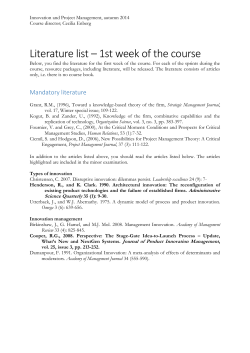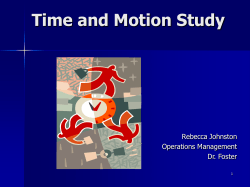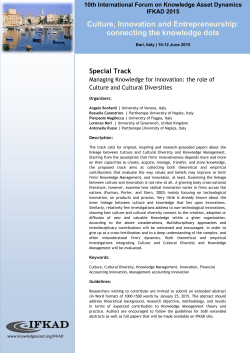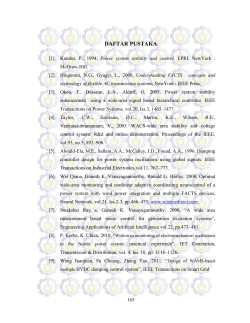
EU Economic Law 2015
Bocconi University Angelo Sraffa Department of Legal Studies PhD in Legal Studies: International Law and Economics Stream EU Economic Law Yane Svetiev Roentgen 1-C1-17 yane.svetiev@unibocconi.it Andrea Biondi (King’s College) Roentgen 1-C1-17 andrea.biondi@kcl.ac.uk Course description The course will be structured as a research seminar focusing on currently topical issues in EU economic law. Specifically, the course will have a number of different objectives: (1) examine some areas of substantive EU economic law, including fields which also have a transnational dimension; (2) discuss a number of regulatory instruments that have been used in the implementation of EU economic law in recent years; (3) read and critically analyse a number of cases on EU economic law, as well as articles from the secondary literature. The participants of the course will be expected to apply some of the themes developed in the course of the discussion of the seminar readings to develop their own research proposals further, including along the analytical and critical dimensions required for a sound PhD dissertation project. The course takes as presumed knowledge an elementary understanding of the workings of the EU, its institutions, as well as the basics of EU law (some of these will have been covered in the PhD course on EU law and policy, but course participants may also wish to consult a hornbook on EU law if necessary as suggested below). The substantive topics covered in the course will include both topical and controversial issues in EU economic law, as well as subject areas related to the research interests of the course participants. Sessions The course will meet for eight sessions of 3 teaching hours as per the calendar distributed for the Second Semester ILE PhD courses. At the beginning of the course, the sessions will focus on a number of substantive topics, based on readings and a seminar-style discussion of the assigned texts. During the final sessions, the PhD candidates will be asked to make a presentation of a refined 1 research proposal by using some of the themes and issues raised and developed in this course, as well as the earlier course on EU Institutions: Law and Policy. The presentations will be based on papers that seek to refine or develop the original research ideas by combining the substantive issues of interest of each PhD candidate with the analytical and critical approaches developed in the course. Assessment Course participants will be assessed on the basis of (1) a set of critical reflections on the assigned weekly readings sent prior to each of the course sessions; (2) the paper and presentation of a research proposal at the end of the course; (3) participation in class discussion, as students will be expected to actively participate in the discussion during the course sessions. To get the maximum benefit from the graduate seminar format of the course, reading of the assigned texts in advance and active discussion will be essential. Therefore, by the morning of each day on which a class session is scheduled, each of you will be expected to send a one-page reaction to the assigned readings, ending with a set of questions for discussion that the readings raised for you. Course syllabus and readings Background readings An elementary hornbook on the basics of EU law may be consulted by candidates who feel that they need to refresh their knowledge of the fundamentals. One possible reference is Catherine Barnard and Steve Peers (eds), European Union Law (Oxford University Press, 2014) Paul Craig and Gráinne de Búrca (eds), The Evolution of EU Law (Oxford University Press, 2nd ed, 2011) 2 Session syllabus Session 1: EU economic law in telecommunications: Beyond liberalisation February 18: 15.30-17.45 Articles: William Melody, ‘The Closing of the Liberalization Era in European Telecommunications’, Competition and Regulation in Network Industries, vol. 13:3, pp. 218-235 (2012) Nina Boeger and Joseph Corkin, ‘How Regulatory Networks Shaped Institutional Reform under the EU Telecoms Framework’, Cambridge Yearbook of European Legal Studies, vol. 14, pp. 49-73 (2011-2012) Jim Davies and Erika Szyszczak, ‘ADR: effective protection of consumer rights?’, European Law Review, vol. 35: 5, pp. 695-706 (2010). Cases: Please choose one of the following cases, making sure that the class divides roughly in two. We will begin our discussions by each group presenting the essential facts and holding of each case. Vodafone: The Queen, on the application of Vodafone Ltd and Others v Secretary of State for Business, Enterprise and Regulatory Reform http://eurlex.europa.eu/LexUriServ/LexUriServ.do?uri=CELEX:62008CJ0058:EN:HTML Alassini: Rosalba Alassini v Telecom Italia SpA http://curia.europa.eu/juris/liste.jsf?num=C-317/08&language=en# 3 Session 2: Three perspectives on agencies and networks, Energy as an excuse: Complex policy goals (YS) February 25: 15.30-17.45 Articles: Eberhard Bohne, ‘Conflicts between national regulatory cultures and EU energy regulations’, Utilities Policy vol.19, pp. 255-269 (2011) Annetje Ottow, ‘Europeanization of the supervision of competitive markets’, European Public Law vol. 18:1, pp. 191-221 (2012) Eric Brousseau and Jean-Michel Glachant, ‘Regulators as Reflexive Governance Platforms’, Competition and Regulation in Network Industries vol. 12:3, pp. 194209 (2011) Optional: For those interested more specifically in energy may read for their own benefit some of the following materials which we will not specifically discuss in class: Peter Cameron, Chapter 3, ‘The EU System of Energy Regulation’, in Competition in Energy Markets: Law and Regulation in the European Union, pp. 95-119 (Oxford University Press, 2007) (skim to understand the background and evolution of EU energy policy, focus on Florence and Madrid Forum) Irina Bordei and Saskia Lavrijssen, ‘ACER: Demystifying the European Energy Supervisor from a Consumer Perspective’, Oil, Gas and Energy Law Intelligence vol.10: 5 pp. 1-26 (2012) Federtility: Federutility, Assogas, Libarna Gas SpA, Collino Commercio SpA, Sadori Gas Srl, Egea Commerciale Srl, E.On Vendita Srl, Sorgenia SpA v. Autorità per l’energia elettrica e il gas, RWE: RWE Vertrieb AG v. Verbraucherzentrale Nordrhein--Westfalen e.V., 4
© Copyright 2025





















